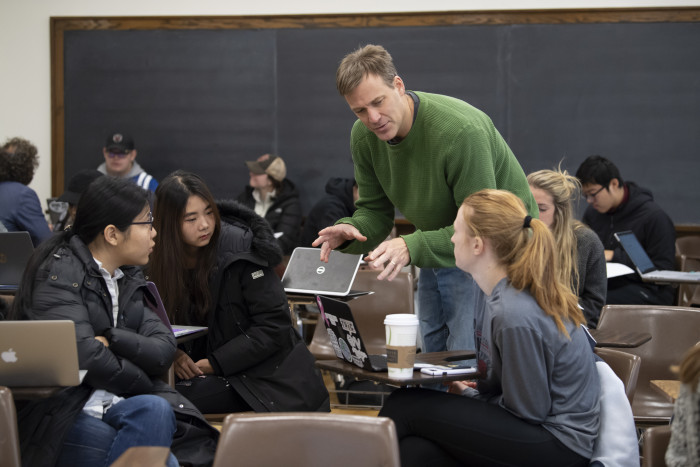Classical studies professor Rebecca Schindler is used to looking to the ancients for answers. So it makes sense that she looked to DePauw’s Latin motto – Decus Lumenque Reipublicae Collegium – for inspiration in rethinking DePauw’s 20-year-old teaching model for the first-year seminar program.
Schindler, who is associate director of the university’s writing program, and her colleagues on the university’s writing committee wanted to generate new excitement around the program and began in fall 2017 to brainstorm strategies. One suggestion was to have a shared syllabus.
That’s when Schindler began to imagine how to do that in conjunction with DePauw's mission and, more specifically, “with our motto in mind,” she says.
DePauw’s motto means “The College is the Splendor and Light of the Common Good.”
“I have always thought that our Latin motto expresses very well what we aspire to do at DePauw – that is, to educate young people in how to be the ‘decus lumenque, the splendor and light of the common good.’”
The first-year seminar seemed to be the perfect place in the curriculum to introduce that concept to students.
What developed is now referred to as the The Decus Seminar model. It’s a cross-disciplinary approach, with three faculty members teaching their own section but with a similar syllabus. The course, Taking on the World, is taught by Schindler; David Alvarez, associate professor of English and chair of the English department; and Erik Wielenberg, professor of philosophy.
They have the same schedule, assignments and grading criteria, but “have given our own voice to each section,” Wielenberg says. There’s a Moodle page so students can share ideas with one another. And the classes come together several times throughout the semester for the professors to teach their selected texts.

Each professor chose two books that are the basis of the curriculum, one historical and one contemporary. The guiding idea is to choose influential books from their disciplines that they believe have shaped and continue to shape the world.
Schindler chose Sophocles’ tragedy “Antigone” from 441 B.C. and “Home Fire” by Kamila Shamsie from 2017. “Every student should read ‘Antigone,’” she says. “This play asks each of us what we would do when faced with political authority we consider unjust. Do we have an obligation to speak up and to act when the state has passed a law that disrespects the bonds of family and fundamentally curtails the rights of citizens to practice their religion?” Schindler wants students to appreciate how exploring Greek and Latin texts can help them negotiate struggles in their contemporary lives.
Wielenberg chose “The Analects of Confucius,” which dates to 500 B.C., and Sebastian Junger’s 2016 book “Tribe.”
“Both works emphasize the importance of meaningful relationships with other people, of belonging to a community and of having an important role to play in that community,” he says. The combination of these books, he says, “helps students to see that even if a work is old – even really old – it doesn’t mean that it is obsolete or has nothing to teach them.”
Alvarez’s books are Jonathan Swift’s “Gulliver’s Travels” from 1726 and Amitav Ghosh’s 2005 “The Hungry Tide.” “I find these texts very useful for thinking about what it means to take on the world,” he says. “‘Gulliver’s Travels’ asks us to think about how our assumptions about the world shape how we see others. It seeks to cultivate in its readers a form of self-reflective rationality.”
Delaney Spencer ’22 likes the team-teaching approach. Since the class is taught by three professors, “it’s always interesting when we come together in one classroom to compare our experiences with each book.”
Wielenberg hopes the seminar will leave the students with a recognition of the deep interconnectedness of human knowledge. “We’re studying works from at least three disciplines – classics, English literature and philosophy – plus a bit of psychology and anthropology and we’re encouraging students to make connections between the different texts and therefore across disciplines.”
Alvarez, Schindler and Wielenberg are eager to teach the course again. It’s been “one of the best teaching experiences I have had at DePauw,” Schindler says. And one of the greatest benefits is “the opportunity to learn from my colleagues.”
Alvarez says that not only did he gain from watching how his colleagues taught but also from their approach to their field of study. “And since we chose our texts because we’re passionate about them, it was inspiring to share what we think our students should experience.”
Says Wielenberg: “Team-teaching a cross-disciplinary, first-year seminar is challenging, but it’s a great opportunity for professors to live and model what a liberal arts education is all about.”
Browse other stories
-
Athletics
-
Football - Robby Ballentine Repeats as D3football.com Second Team All-America
-
Men's Basketball - DePauw Extends Win Streak to Five; Jacobs Reaches 1,000-Point Plateau
-
Women's Basketball - Tigers Top Ephs for Third Straight Win
More Athletics
-
-
News
-
Student and Professor Share Unexpected Writing Journey
-
Four in a Row! DePauw Wins 131st Monon Bell Classic
-
Jim Rechtin '93 Featured in Fortune Magazine
More News
-
-
People & Profiles
-
Entrepreneurs Eric Fruth ’02 and Matt DeLeon ’02 Are Running More Than a Business
-
Rick Provine Leaves Legacy of Leadership and Creativity
-
History Graduate Cecilia Slane Featured in AHA's Perspectives on History
More People & Profiles
-
-
Have a story idea?
Whether we are writing about the intellectual challenge of our classrooms, a campus life that builds leadership, incredible faculty achievements or the seemingly endless stories of alumni success, we think DePauw has some fun stories to tell.
-
Communications & Marketing
101 E. Seminary St.
Greencastle, IN, 46135-0037
communicate@depauw.eduNews and Media
-
News media: For help with a story, contact:
Bob Weaver, Senior Director of Communications.
bobweaver@depauw.edu.